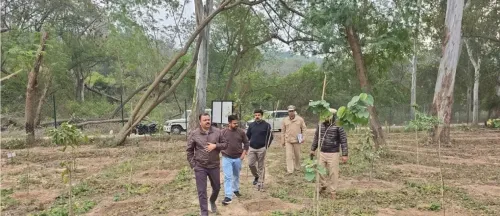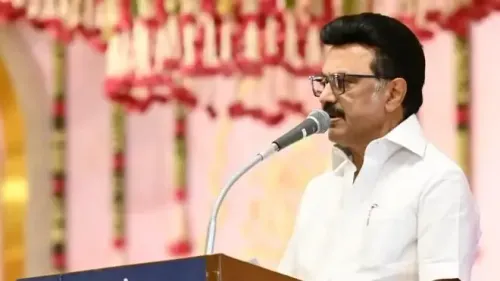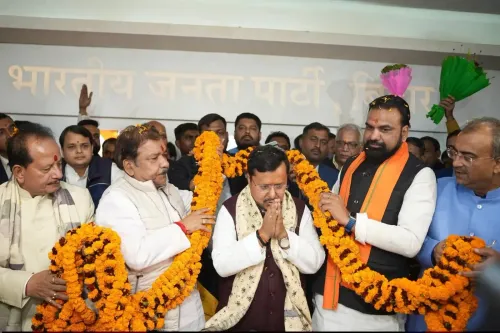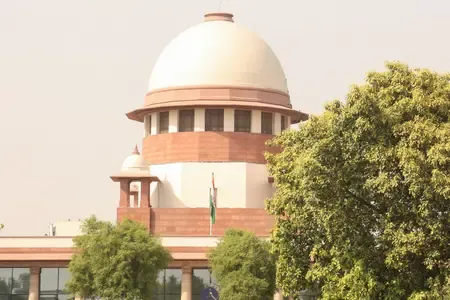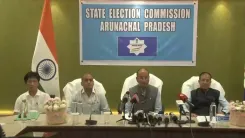Supreme Court Halts Notice Regarding Well Near Sambhal Mosque

New Delhi, Jan 10 (NationPress) In a temporary order issued on Friday, the Supreme Court directed the Sambhal Municipal Council to refrain from acting on its notice concerning a well located next to the Shahi Jama Masjid.
A bench composed of Chief Justice of India (CJI) Sanjiv Khanna and Justice Sanjay Kumar requested the Uttar Pradesh authorities to submit a status report within two weeks, and simultaneously mandated that no actions should be taken regarding the well.
Senior advocate Huzefa Ahmadi, representing the mosque committee, pointed out that the contested notice referred to the location as 'Hari Mandir' and expressed concerns that the opposing side might start utilizing the well for 'puja (worship)', bathing, and other purposes.
Ahmadi elaborated that the well, which is “half inside and half outside” the mosque grounds, has been historically used by the mosque administration for drawing water. Conversely, advocate Vishnu Shankar Jain, representing the Hindu plaintiffs, argued that a well situated outside the mosque's jurisdiction cannot be a subject of the proceedings contesting the district court's survey order of the disputed site. In response, the apex court noted that it would closely monitor the situation to ensure that peace and harmony are maintained.
“Issue notice returnable on Feb 21. Meanwhile, a status report will be submitted by the respondents within two weeks. The respondents (authorities) must not act on any notice related to the well,” the SC directed.
The next hearing is scheduled for February 21.
On November 29, the CJI Khanna-led Bench advised the Uttar Pradesh government that “peace and harmony must be upheld” while addressing a plea from the Sambhal Shahi Jama Masjid Committee seeking to suspend a district court-ordered survey of the mosque. However, it advised the mosque committee to seek redress from an appropriate forum against the district court's survey order and, in the interim, instructed the trial court to halt proceedings.
The apex court clarified that if any appeal is filed before the Allahabad High Court or another forum, it would be scheduled within three working days of submission.
It was made clear that the Supreme Court has not expressed any opinion on the merits of the case, and it was ordered to re-list the matter in the week starting January 6.
In its Special Leave Petition, the Sambhal Shahi Jama Masjid Committee sought a temporary and ex-parte stay on the execution of the challenged decision made by Chandausi’s Civil Judge on November 19, which mandated a survey in response to a plea from Hindu petitioners asserting that the mosque was constructed by Mughal invader Babur in 1526 after demolishing Shri Harihar Mandir. Additionally, it requested that the survey commissioner's report be kept confidential and that the status quo should remain until the matter is resolved by the Supreme Court.
The petition also requested that surveys should not be routinely ordered and conducted in disputes over places of worship without hearing all parties involved and giving sufficient time for affected individuals to seek judicial remedies against the survey order.
The survey of Shahi Jama Masjid took place on November 19 and November 24. As the second phase of the survey commenced at the mosque, violence erupted in the vicinity, resulting in four fatalities.
In a related decision, the CJI Khanna-led Special Bench, in a temporary order issued on December 12, declared that no new lawsuits would be filed under the Places of Worship Act, 1991, throughout the country, and that in ongoing cases, no final or effective decisions would be made until further notice. The Special Bench, which also included Justices Sanjay Kumar and K.V. Viswanathan, instructed the Union government to submit its response to a series of petitions challenging the legality of the Places of Worship Act within four weeks. This Act prohibits lawsuits aimed at reclaiming a place of worship or altering its status from what existed on August 15, 1947.
As per
pds/dpb


